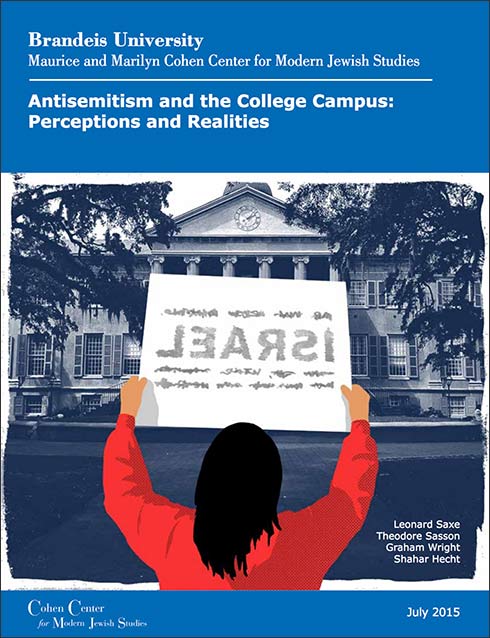Antisemitism and the College Campus: Perceptions and Realities
Leonard Saxe, Theodore Sasson, Graham Wright, Shahar Hecht
July 2015
 Antisemitism on the College Campus: Perceptions and Realities has two aims: first, to understand the extent of hostility toward Israel and antisemitism on North American campuses and second, to assess the relationship between these trends and Jewish students’ support for and connection to Israel. The study, conducted in spring 2015, draws on a survey of US and Canadian college students and young adults who applied to Birthright Israel.
Antisemitism on the College Campus: Perceptions and Realities has two aims: first, to understand the extent of hostility toward Israel and antisemitism on North American campuses and second, to assess the relationship between these trends and Jewish students’ support for and connection to Israel. The study, conducted in spring 2015, draws on a survey of US and Canadian college students and young adults who applied to Birthright Israel.
- Read the report
- Read the executive summary in Hebrew
- Read the technical appendices
- Read the oped: What do college students really know about Israel? ejewishphilanthropy. November 3, 2015.
Key Findings
- More than one-quarter of undergraduate respondents describe hostility toward Israel on campus by their peers as a “fairly” or “very” big problem and nearly 15% perceive this same level of hostility toward Jews.
- Nearly one-quarter of respondents report having been blamed during the past year for the actions of Israel because they were Jewish.
- About one-third of college undergraduate respondents report having been verbally harassed during the past year because they were Jewish.
- Nearly three-quarters of respondents report having been exposed at one time during the past year to at least one of six antisemitic statements.
- Despite a significant number perceiving their campus environment to be hostile to Israel and Jews, students report high levels of connection to Israel. These levels of connection are higher than those found among similar individuals in 2014, before the Israel-Hamas conflict.
- Connection to Israel is the strongest predictor of perceiving a hostile environment toward Israel and Jews on campus and, to a lesser extent, of personal experiences of antisemitic verbal harassment. It is likely that those who are highly connected to Israel become a target of antisemitic or anti-Israel sentiment because they make their support for Israel known. It is also likely that those who are more connected to Israel are more sensitive to criticism of Israel, or more likely to perceive such criticism as antisemitic.